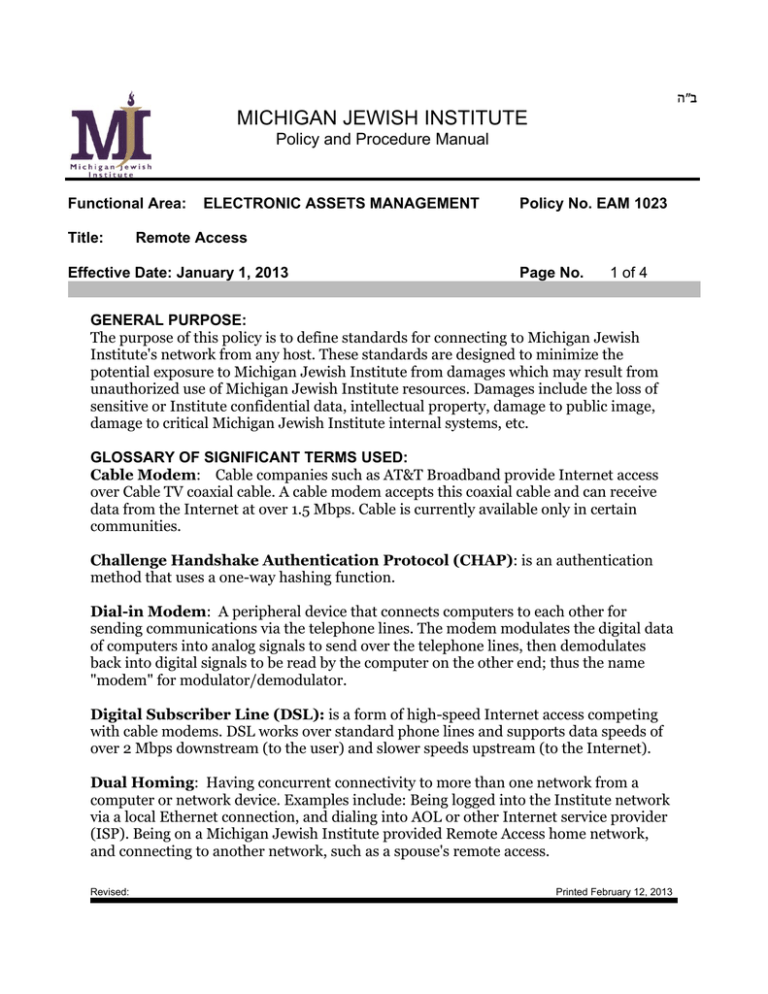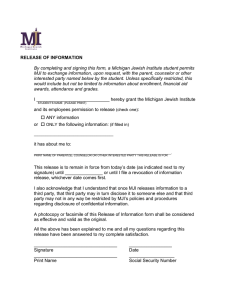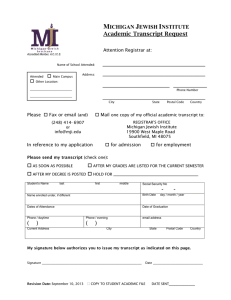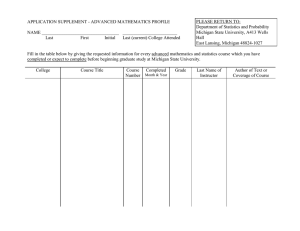MICHIGAN JEWISH INSTITUTE Policy and Procedure Manual
advertisement

ב "ה MICHIGAN JEWISH INSTITUTE Policy and Procedure Manual Functional Area: Title: ELECTRONIC ASSETS MANAGEMENT Policy No. EAM 1023 Remote Access Effective Date: January 1, 2013 Page No. 1 of 4 GENERAL PURPOSE: The purpose of this policy is to define standards for connecting to Michigan Jewish Institute's network from any host. These standards are designed to minimize the potential exposure to Michigan Jewish Institute from damages which may result from unauthorized use of Michigan Jewish Institute resources. Damages include the loss of sensitive or Institute confidential data, intellectual property, damage to public image, damage to critical Michigan Jewish Institute internal systems, etc. GLOSSARY OF SIGNIFICANT TERMS USED: Cable Modem: Cable companies such as AT&T Broadband provide Internet access over Cable TV coaxial cable. A cable modem accepts this coaxial cable and can receive data from the Internet at over 1.5 Mbps. Cable is currently available only in certain communities. Challenge Handshake Authentication Protocol (CHAP): is an authentication method that uses a one-way hashing function. Dial-in Modem: A peripheral device that connects computers to each other for sending communications via the telephone lines. The modem modulates the digital data of computers into analog signals to send over the telephone lines, then demodulates back into digital signals to be read by the computer on the other end; thus the name "modem" for modulator/demodulator. Digital Subscriber Line (DSL): is a form of high-speed Internet access competing with cable modems. DSL works over standard phone lines and supports data speeds of over 2 Mbps downstream (to the user) and slower speeds upstream (to the Internet). Dual Homing: Having concurrent connectivity to more than one network from a computer or network device. Examples include: Being logged into the Institute network via a local Ethernet connection, and dialing into AOL or other Internet service provider (ISP). Being on a Michigan Jewish Institute provided Remote Access home network, and connecting to another network, such as a spouse's remote access. Revised: Printed February 12, 2013 ב "ה MICHIGAN JEWISH INSTITUTE Policy and Procedure Manual Functional Area: Title: ELECTRONIC ASSETS MANAGEMENT Policy No. EAM 1023 Remote Access Effective Date: January 1, 2013 Page No. 2 of 4 Frame Relay: A method of communication that incrementally can go from the speed of an ISDN to the speed of a T1 line. Frame Relay has a flat-rate billing charge instead of a per time usage. Frame Relay connects via the telephone company's network. Integrated Services Digital Network (ISDN): There are two types of Integrated Services Digital Network or ISDN: BRI and PRI. BRI is used for home office/remote access. PRI has two "Bearer" channels at 64kbit (aggregate 128kb) and 1 D channel for signaling info. Remote Access: Any access to Michigan Jewish Institute's Institute network through a non MJI controlled network, device, or medium. Split-tunneling: Simultaneous direct access to a non-Michigan Jewish Institute network (such as the Internet, or a home network) from a remote device (PC, PDA, WAP phone, etc.) while connected into Michigan Jewish Institute's Institute network via a VPN tunnel. VPN Virtual Private Network (VPN): is a method for accessing a remote network via "tunneling" through the Internet. BACKGROUND/POLICY: Scope: This policy applies to all Michigan Jewish Institute employees, faculty, students, contractors, vendors and agents with a Michigan Jewish Institute-owned or personallyowned computer or workstation used to connect to the Michigan Jewish Institute network. This policy applies to remote access connections used to do work on behalf of Michigan Jewish Institute, including reading or sending email and viewing intranet web resources. Remote access implementations that are covered by this policy include, but are not limited to, dial-in modems, frame relay, ISDN, DSL, VPN, SSH, and cable modems and any others that may evolve over time. Revised: Printed February 12, 2013 ב "ה MICHIGAN JEWISH INSTITUTE Policy and Procedure Manual Functional Area: Title: ELECTRONIC ASSETS MANAGEMENT Policy No. EAM 1023 Remote Access Effective Date: January 1, 2013 Page No. 3 of 4 General Policy: 1. It is the responsibility of Michigan Jewish Institute employees, faculty, students, contractors, vendors and agents (hereinafter, MJI user community) with remote access privileges to Michigan Jewish Institute's Institute network to ensure that their remote access connection is given the same security consideration as the user's on-site connection to Michigan Jewish Institute. 2. General access to the Internet for recreational use by immediate household members through the Michigan Jewish Institute Network on personal computers is not permitted. The MJI user community is responsible to ensure that family members do not access any Michigan Jewish Institute network services. Members of the MJI user community bear responsibility for all consequences should they share their remote access with unauthorized individuals. PROCESS: 1. Secure remote access must be strictly controlled. Control will be enforced via one-time password authentication. 2. At no time should any member of the MJI user community provide their login or email password to any others, including their family members. 3. MJI user community members with remote access privileges must ensure that their Michigan Jewish Institute-owned or personal computer or workstation, which is remotely connected to Michigan Jewish Institute's Institute network, is not connected to any other network at the same time, with the exception of personal networks that are under the complete control of the user. 4. MJI user community members with remote access privileges to Michigan Jewish Institute's Institute network must not use non-Michigan Jewish Institute email accounts (i.e., Hotmail, Yahoo, AOL), or other external resources to conduct Michigan Jewish Institute business, thereby ensuring that official business is never confused with personal business. Revised: Printed February 12, 2013 ב "ה MICHIGAN JEWISH INSTITUTE Policy and Procedure Manual Functional Area: Title: ELECTRONIC ASSETS MANAGEMENT Policy No. EAM 1023 Remote Access Effective Date: January 1, 2013 Page No. 4 of 4 5. Routers for dedicated ISDN lines configured for access to the Michigan Jewish Institute network must meet minimum authentication requirements of CHAP. 6. Reconfiguration of a home user's equipment for the purpose of split-tunneling or dual homing is not permitted at any time. 7. Frame Relay must meet minimum authentication requirements of DLCI standards. 8. Non-standard hardware configurations must be approved by the MJI Information Technology Department. 9. All hosts that are connected to Michigan Jewish Institute internal networks via remote access technologies must use the most up-to-date anti-virus software, This includes personal computers. 10. Personal equipment that is used to connect to Michigan Jewish Institute's networks must meet the current requirements of Michigan Jewish Institute-owned equipment for remote access. 11. Organizations or individuals who wish to implement non-standard Remote Access solutions to the MJI production network must obtain prior approval from the MJI Information Technology Department. Any member of the MJI user community found to have violated this policy may be subject to disciplinary action, up to and including termination of their relationship with MJI. AUTHORIZATIONS: (at least one signature is necessary to enact this policy/procedure) ___________________________ President Revised: ______________________________ Dean Of Academic Administration Printed February 12, 2013




